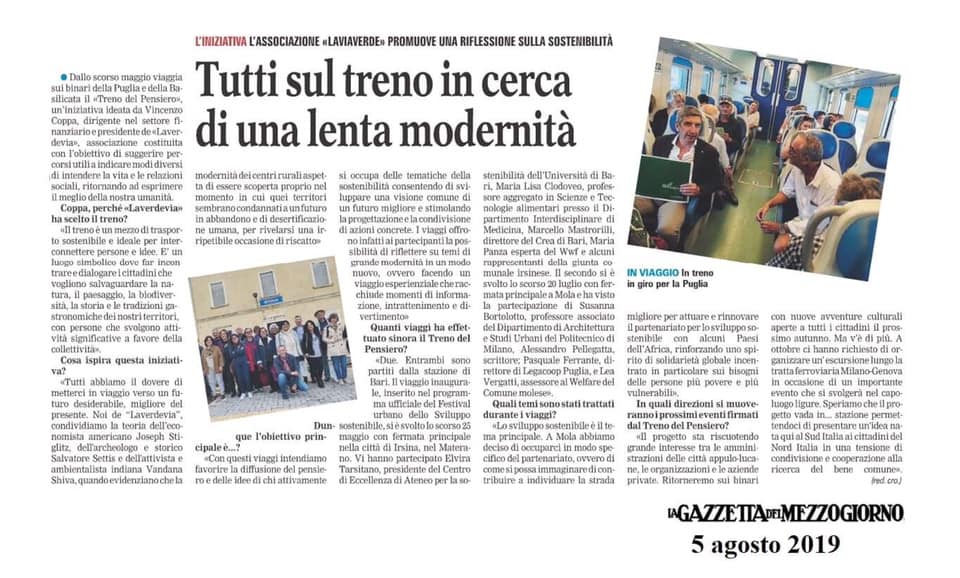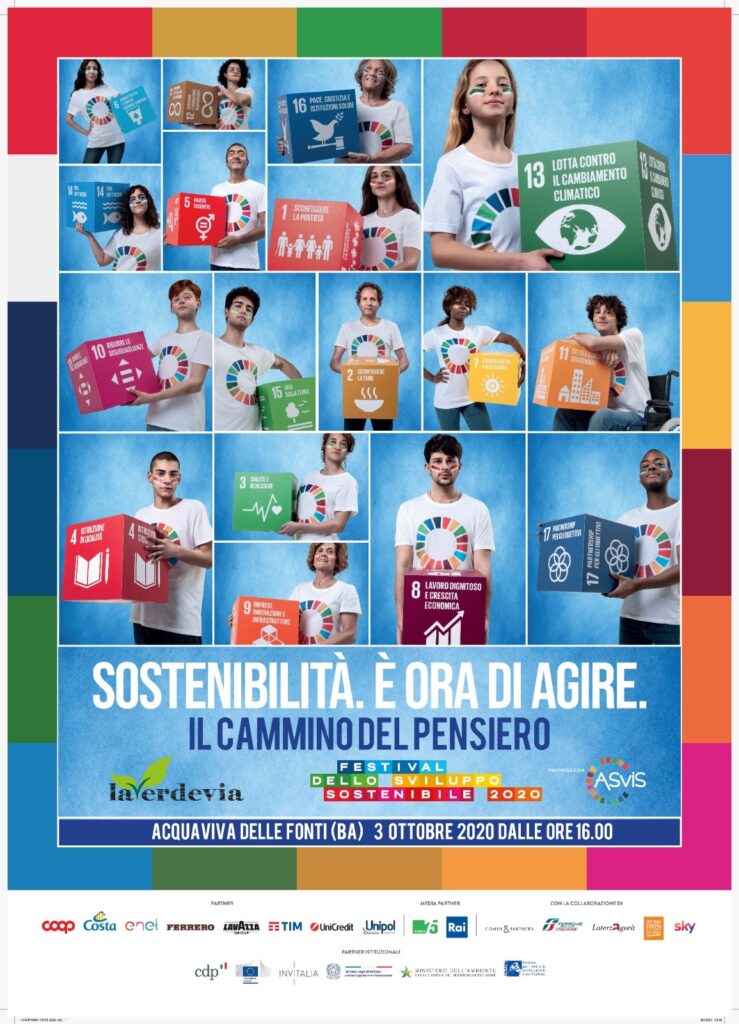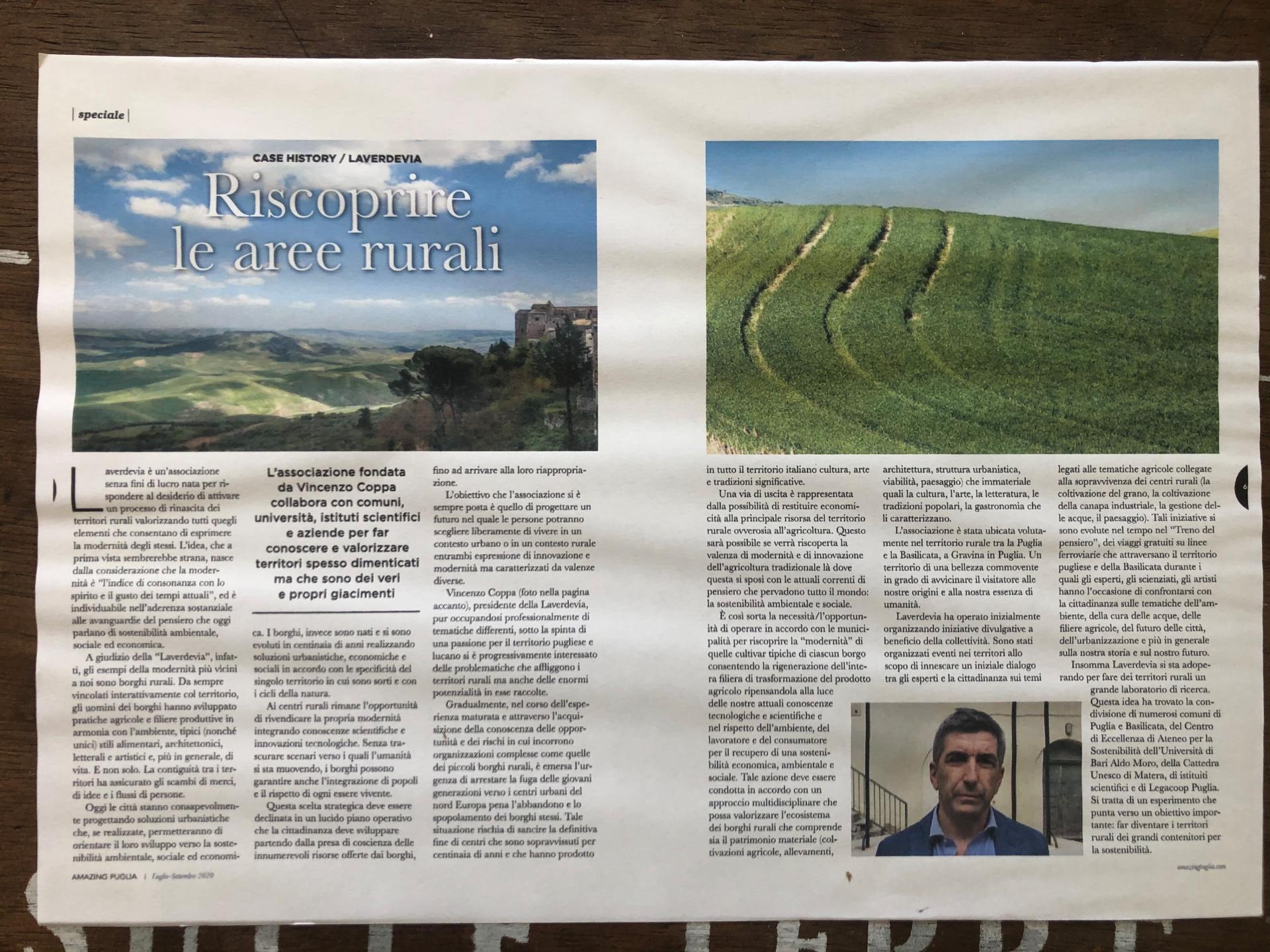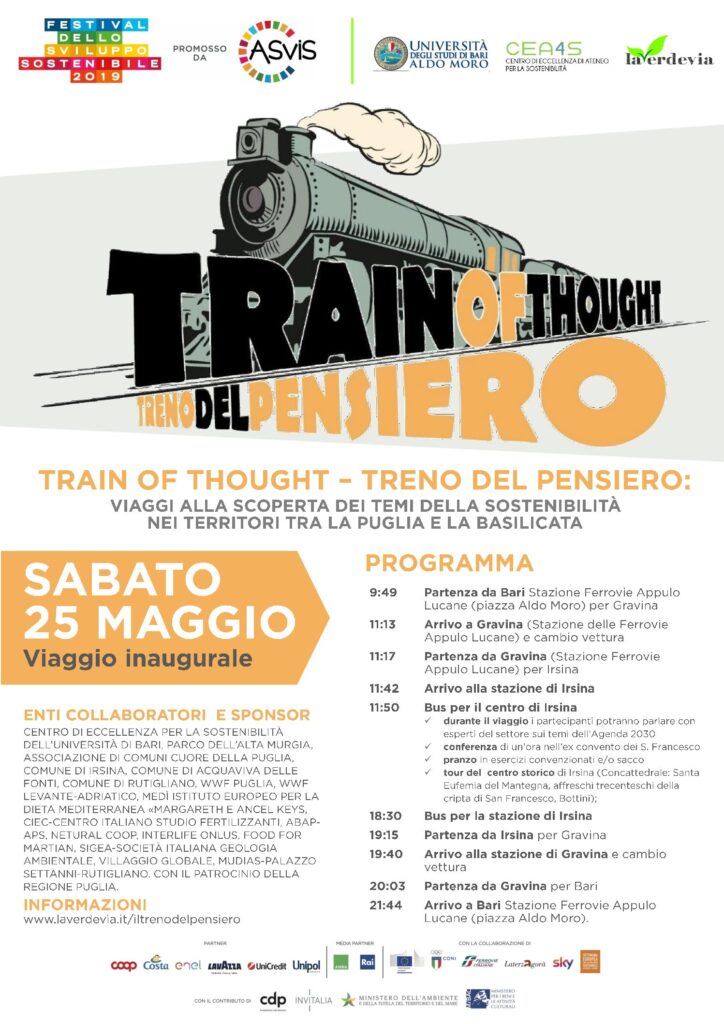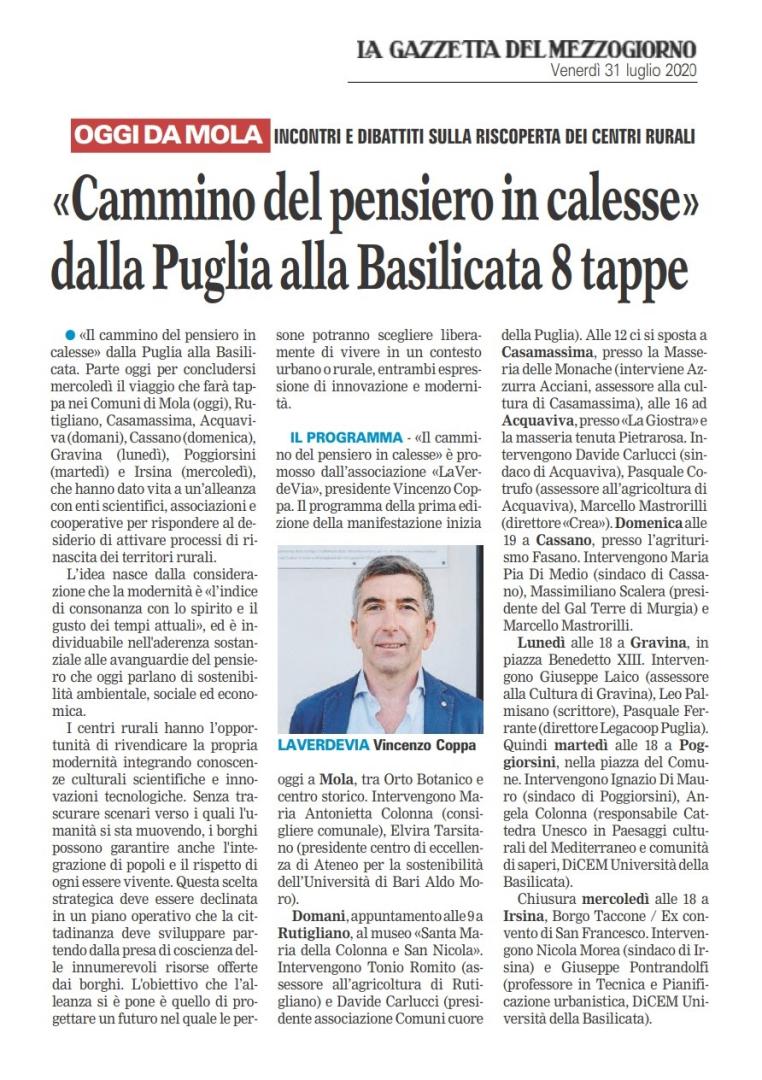train of thought / walk of thought
Basic information
Project Title
Full project title
Category
Project Description
The aim of the project is to spread in the citizens the key role of material and immaterial cultural heritage, sustainable agriculture, natural diversity, soil fertility, water management and their transformation chains; • experiment and develop agricultural practices, production chains and social organization according with the principles of sustainability as defined by the UN 2030 Agenda for Sustainable Development.
Project Region
EU Programme or fund
Description of the project
Summary
The project was sustained by some founding bodies UNESCO Chair of Basilicata University; Center for Sustainability of Bari University; “LAVERDEVIA”; “Associazione dei Comuni Cuore della Puglia”, CIEC (Italian Scientific Center of Fertilizers); ABAP – A.P.S. “LEGACOOP Puglia”; the Municipalities of Acquaviva; Poggiorsini; Irsina; Mola di Bari; Rutigliano.
The founding bodies have unanimously recognized that the principles of the UN 2030 Agenda for Sustainable Development, can play a key role in favour of rural areas. They believe that the adoption of the 17 objectives of the UN 2030 Agenda for Sustainable Development could improve the strengths of the rural areas represented by:
- the natural resources (mainly soil, water, air) and landscapes,
- the economy linked to agricultural and livestock activities, and their respective transformation chains,
- the urban structure of the rural centers,
- the relationship of the towns with their agricultural territory and the other surrounding rural centers,
- citizenship and culture that it expresses,
- all the tangible and intangible assets that characterize the area.
The current condition of the rural areas leads us to imagine that the settlement of the population in small centers distributed throughout the territory and relatively self-sustained but strongly interconnected could represent an alternative model of society. This model could not only facilitate the achievement of the objectives of the United Nations 2030 Agenda on sustainability but could make it easier to control pandemics by reducing the need for strict controls on the individual and the risk of violating their rights.
The project is aimed to spread this idea in the citizens during lovely journeys by train (sustainable journeys) from the city of Bari to little villages/towns in the rural neiborhood talking about it with the local poets, head officers of municipalities, professors, writers, architects, artisans that have acted in favours of soustainaility
Key objectives for sustainability
There is no possibility of sustainable development if there is no sharing and cooperation between the stakeholders of a territory (citizenship, economic operators, municipalities and scientific bodies). it is important to develop a strategic vision shared by all these actors that allows them to achieve the common good. The first activity to do is to spread these ideas in an innovative, pleasant, shared and multidisciplinary way, overcoming the obstacles connected with the lecturer - learner relationship and transforming an experience of intellectual engagement into an experience of enjoying the beauty of places and culture. which also gives rise to the desire to preserve them. The organized trips were carried out on the different themes of the 2030 agency between 2018 - 2020, providing for a journey by scheduled train, the arrival in a historical art place, the discussion of the topic with one or more personalities, the tasting of local foods, listening to music and songs by local artists.
These trips made it possible to create bonds and knowledge between the participants, providing inspiration for other projects on sustainability that were carried out either with the municipalities or with the actors involved in the meetings.
• Train of thought: Goal 7 of the United Nations 2030 Agenda of 6/12/2019
• Train of thought: goal of the United Nations 2030 agenda of 7/10/2019
• Train of thought: Goal 17 of the United Nations 2030 Agenda of 20/07/2019
Key objectives for aesthetics and quality
Those who decide to participate in the train of thought have the opportunity to have multiple experiences.
The first is an aesthetic experience of physical movement from one place to another carried out with an environmentally friendly vehicle that allows you to get in touch with unfamiliar people with whom you are almost forced to share the same spaces. It is also an experience that allows you to visit places that characterize the peripheral areas of the cities and that, sometimes, we never know enough, to enjoy the beauties of the rural landscape we pass through or to sadden ourselves for any degradation, allowing in these cases a reflection on the way in which we manage the territory in which we live.
The second is an aesthetic experience directly linked to the observation and discovery of the place where one arrives (usually a rural place) in which the municipality takes steps to welcome visitors as if they were guests of great respect, exchanging courtesies in a relationship of reciprocal. respect and harboring a desire for knowledge.
The third experience is that of thought - Thought can be linked to the moment in which you enjoy the journey, the beauty of the landscape, the tasting of food, the conversation with your travel companion or with the personality symbol of sustainability. Thought can also be a strategic thought that develops a vision of what the future of the place could be if we continue to act as we have always done or if we change the approach following the principles of sustainability of the 2030 agenda of the United Nations.
The trips made convey enormous strength and determination to act.
Key objectives for inclusion
The exchange of our opinions and visions on our near and desirable future is a fertile ground for confrontation between academics, scientists, economic operators and citizens. This confrontation must be free and open to everybody without distinction of gender, educational qualification, profession, religious or political belief.
The train of thought is aimed at everyone ad is advertidìsed through messagese on social media and word of mouth.
Its aim is the most inclusive knowledge and dissemination and comparison without setting limits of any kind.
People are invited in listening and in overcoming any type of costrains so that they can exchange their views or ask questions and interface directly with the guests.
The train journey is carried out by buying a scheduled ticket and making the discussion and the event public even with passengers normally present in the wagons.
Results in relation to category
The first journey of the train of thought took place with people who wanted to visit a rural region reflecting on the lyrics of Rocco Scotellaro who was a famous poet. Rocco Scotellaro was the son of peasants and in his works he narrated the life of the poor local populations who in the 50s of the early twentieth century lived in hardship in agricultural territories. Although these populations aspired to a more dignified life, they loved and courageously defended their local traditions.
The train of thought united the spirit of the poet of the 50s of the early twentieth century and the spirit of current generations who demand sustainable lifestyles to fight climate crises. The train of thought unites the two souls arriving from the past and the present to develop a positive outlook on the future.
In fact, the train of thought allows the enchanted observation of the landscape in its complexity made up of woods, hills, cultivated and uncultivated lands, rivers, isolated houses, villages, roads and railways, fauna, flora and people and traditions, listening to thinkers in the most diverse scientific and artistic fields (musicians, poets, filmmakers, scientists, academics, entrepreneurs) who work on sustainability issues.
In this way, participating in an edition of the train of thought can grasp the beauty and aesthetics of a message that transcends our existence and that travels to the lives of our children and grandchildren and more generally of our posterity.
It is thus possible to develop personal but also collective thoughts, food for thought necessary to promote actions that aim at improving the health of our planet and our future life.
How Citizens benefit
The journeys of the train of thought have brought the managers of the different cities in contact with each other, allowing them to improve their knowledge and their potential for collaboration. Travel has also consolidated alliances around sustainability issues, giving life to joint projects. These new projects aim to promote the adoption of sustainable lifestyles and work and affect the main economic activities of the region (agriculture, tourism, education). In this way it has been possible to initiate virtuous initiatives and experiments of various kinds ( see the website www.laverdevia.it
Innovative character
The innovative elements of the project are simplicity and diversity.
The project aims to (1) bring the population closer to the simplicity of beauty that our planet expresses in its most disparate and most obvious forms to an unattentive eye. To give an example, think of the simple observation of the sky and clouds or a starry sky which, for any person of any age, gender, believe or nationality, are moments pervaded by a sense of wonder and amazement at the source of beauty and harmony; (2) wants to do it by allowing simple and easy moments (train journeys) in which people can feel free from the constraints imposed on them by normal daily activities or outside the places where they normally live and which represent real barriers that prevent the perception of beauty; (3) wants to do it in conditions of sustainability (travel by train or by carriage or on foot); (4) wants to do it for everyone in a free and inexpensive way; (5) wants to achieve a simple, cordial and non-academic exchange of views or a true flow of information between the knowledge hubs represented by experts from various disciplines and committed to sustainability and citizenship that gives back to the experts their feelings, experiences and knowledge; (5) wants to allow the birth of ideas and initiatives in a free and spontaneous way as simple as the blossoming of a simple daisy.

